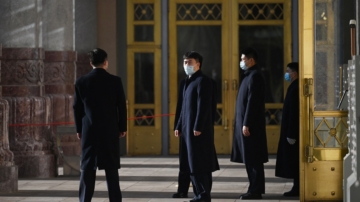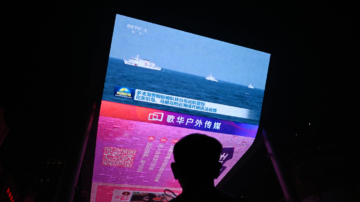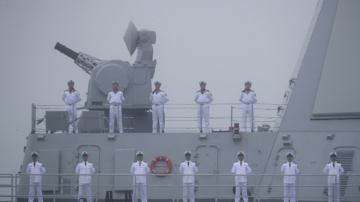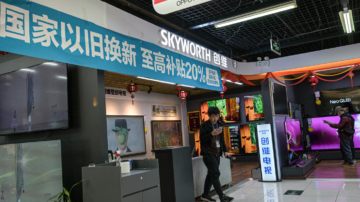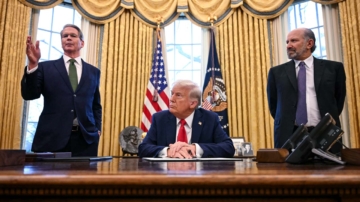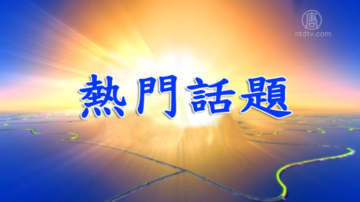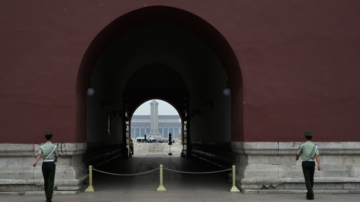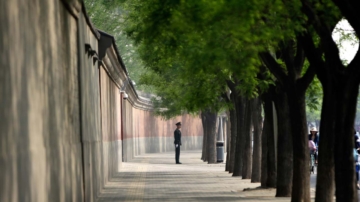【新唐人2014年01月09日讯】中共当局对互联网频频“亮剑”,自去年下半年掀起全国网路严打后,日前有消息透露,中共即将成立“信息化和互联网信息安全领导小组”,中共三大巨头亲自上阵管理网路,说明甚么呢? 请看本台记者李韵的报导。
北京资深传媒人高瑜透露,中共当局即将成立“信息化和互联网信息安全领导小组”,中共总书记习近平出任组长,总理李克强、中宣部长刘云山任副组长,中共互联网信息办主任鲁炜,则出任小组办公室主任。
北京时政观察人士华颇指出,中共三大巨头亲自上阵管理网路,说明中共将掀起新一轮更严厉的网络打压。
北京时政观察人士华颇:“网路对于中共来讲是一个大患,因为各种信息它用传统的手段已经控制不住了,像以前它可以控制传统的报纸、媒体、广播电台和电视台,那是中共筹办的,所以它控制信息、控制舆论驾轻就熟,但是网路兴起来之后,中共不可能一手遮天。”
近年来“网路反腐”风起云涌,已成为中国民众反腐败的一把利器。从“名烟局长”周久耕,到重庆“不雅视频”,再到上海高院法官集体嫖娼等一系列事件中,都与民众举报有关。
仅中共“十八大”之后,已有9位副部级及以上的高官落马。刘铁男、李春城、倪发科、王素毅、李达球等高官落马,也都和网路举报有关。
香港《蘋果日报》披露,自去年下半年以来,中共高层已多次在党内会议上,就媒体,特别是互联网,出现反毛、反共、否定社会主义制度的现象,发出指示,说不能容忍挑衅,因此呼吁各级官员要“敢抓敢管、敢于亮剑”,并警告,如果不还击,将“亡党亡国”。
1月3号,中共公安部长郭声琨在《人民日报》呼吁,所谓抵制西方反华意识形态渗透、打击境内外敌对势力,要确保共产党政权安全,加强网路管理等。另外,中共中央政法委秘书长汪永清也发声说,面对涉及中共领导等原则问题的政治挑衅,“必须敢于亮剑,决不做骑墙派”。
北京资深传媒人高瑜指出,中共的维稳政策已经提高到意识形态的高度。
北京资深传媒人高瑜:“在周永康时代也提起要严防死守等等,但是像现在这样作为党的心腹大患、亡党亡国,这种高度又升格了,在管理意识形态方面,限制言论自由、新闻自由这种最基本人权方面又升级了。”
华颇指出,中共对网路的控制已经失灵,所以将用专政“铁拳”投入这场舆论争夺战。
华颇:“它在网路阵地是接连失手,所以它要加强控制,所以它才打算建立一个高规格的一个控制机构,可以协调各个部门的资源和力量来整治网路,我想这是中共一贯的对网路打压的延续。”
去年4月,中共就曾发出《关于当前意识形态领域情况的通报》(俗称九号文件),其中提出,西方宪政民主观念乃中共统治的“最大危机”。
到了8月,中共下令对网络“亮剑”,于是掀开全国互联网严打行动,大肆抓捕网路活跃人士,短短几天内就有数千人被抓捕。拥有数千万粉丝的网路“大V”名人薛蛮子被拘捕,罪名却是“聚众淫乱”﹔而网上声援支持“公盟”维权组织的富豪王功权,则以“寻衅滋事”理由拘捕他。
时事评论员林子旭:“现在的网路信息传输技术是越来越发达了,各种各样的信息通过各种渠道在民众中快速流通,中共根本就挡不住,所有打压的做法都犹如抱薪救火,只能进一步增加民众对舆论自由的渴望。”
时事评论员林子旭指出,中共越是这样从上到下的折腾,越说明中共在网路管理环节上的脆弱,同时也让人们看出中共的恐慌。除非中共“断网”,否则的话,中国社会的舆论环境,在民众的争取之下,必然会越来越自由。看清了真相的民众,最终也必然选择抛弃中共。
采访编辑/李韵 后制/孙宁
Xi Jinping Leads The Internet Security Team
The Chinese regime repeatedly cracks down on
the social networks.
Last year it launched national online suppression.
Recently, sources said that the Chinese Communist Party
(CCP) will form an "IT and Internet Security Leadership Team"
Xi Jinping will be the team leader.
Beijing senior media person Gao Yu reveals that
Xi is the team leader, Premier Li Keqiang and propaganda
minister Liu Yunshan are the deputy team leaders and
director of IT office Lu Wei is the office manager.
Hua Po, Beijing current affairs observer says that
the three top leaders control the internet in person,
indicating that a new wave of internet sweeping will be launched.
Hua Po: "Internet is the CCP's big concern. Because it cannot
control the internet with traditional ways of suppression.
In the past, it could control newspaper, media, tv and radio,
which were established by the CCP, so it is used to controlling them.
After the internet developed, the CCP couldn't simply
cover up information."
In recent years, anti-corruption online campaigns
have appeared one after another.
It becomes a sharp tool against officials' corruption.
Such as the embezzlement of luxury cigarettes incident,
Chongqing official's sex video and Shanghai judges group
hire of prostitutes incident.
They were all reported by civilians via the internet.
After the CCP's 18th national meeting, nine high-ranking
officials at deputy-minister level and above were dismissed.
It included Liu Tienan, Li Chuncheng.
They were all related to the internet reporting.
Hong Kong's Apple Daily exposes that in the last half year in 2013,
at several high-level meetings regarding the media,
especially on the internet, there was a phenomenon
of criticism against Mao, against the CCP and against socialism.
Officials said they couldn't tolerate such provocation.
They called officials at all levels to "manage and control the
internet bravely: dare to act".
They warned, that without fighting back, the party and the
country will collapse.
On Jan. 3, the state police chief Guo Shengkun urged via
the People's Daily that one must resist Western ideology
against China, must crackdown on hostile forces from
overseas, ensure the safety of CCP power and
strengthen control of the internet.
In addition, an official, Wang Yongqing also said that when
facing political challenge to the CCP's leaders,
"one must dare to act, never be fence-sitters."
Gao Yu says that the CCP's policy of maintaining stability
has increased to the level of ideology.
Gao Yu: "Zhou Yongkang's era also mentioned deadly
control of the internet and defense of the CCP.
Now social networks are being treated as the CCP's big
concern which could collapse party and country,
thus suppression has risen to a higher level.
On ideology, they increasingly limit freedom
of expression and freedom of publication to a new level,
a restriction on such basic human rights."
Hua Po says that control of the internet has failed, thus
they use dictatorship's "iron fist" to forcibly launch this battle.
Hua Po: "The CCP repeatedly failed on the internet battle, so
it needs to strengthen control by setting up a high-level
control team.
They use this method to manage various resources
and forces to suppress the internet.
I think it is a continuation of the CCP's common practice
of online suppression."
In April 2013, the CCP issued a document about the status
of information on current ideology.
The document says that Western ideas on constitutional
democracy are the CCP's "biggest crisis".
In August, the regime ordered strengthening of
internet control. The serious crackdown on the internet was
initiated.
Many online activists were arrested; in a short time,
thousands of people were detained.
Online big blogger Xue Manzi, who has hundreds of thousands
of fans, was arrested for soliciting prostitution.
Another big blogger Wang Gongquan, who openly
supports online sharing about the New Citizens' Movement,
was arrested for allegedly “gathering people to disturb order
on a public occasion.”
Lin Zixu, current affairs commentator: "Now that internet
transmission has increasingly developed,
varied information is rapidly spread via
various channels in the public domain.
The CCP cannot simply prevent it, all suppression
is like holding wood to fight fire.
It can only further increase public desire
for freedom of opinion."
Lin Zixu says that the more the CCP puts effort
into suppression, the more it indicates its weakness
in the management of the internet.
Meanwhile it makes people notice that the CCP is in a panic.
Unless the CCP shuts down the internet, the public will gain
more freedom of opinion in the struggle.
After seeing the truth, people will inevitably
choose to abandon the CCP.
Interview & Edit/LiYun Post-Production/SunNing
北京资深传媒人高瑜透露,中共当局即将成立“信息化和互联网信息安全领导小组”,中共总书记习近平出任组长,总理李克强、中宣部长刘云山任副组长,中共互联网信息办主任鲁炜,则出任小组办公室主任。
北京时政观察人士华颇指出,中共三大巨头亲自上阵管理网路,说明中共将掀起新一轮更严厉的网络打压。
北京时政观察人士华颇:“网路对于中共来讲是一个大患,因为各种信息它用传统的手段已经控制不住了,像以前它可以控制传统的报纸、媒体、广播电台和电视台,那是中共筹办的,所以它控制信息、控制舆论驾轻就熟,但是网路兴起来之后,中共不可能一手遮天。”
近年来“网路反腐”风起云涌,已成为中国民众反腐败的一把利器。从“名烟局长”周久耕,到重庆“不雅视频”,再到上海高院法官集体嫖娼等一系列事件中,都与民众举报有关。
仅中共“十八大”之后,已有9位副部级及以上的高官落马。刘铁男、李春城、倪发科、王素毅、李达球等高官落马,也都和网路举报有关。
香港《蘋果日报》披露,自去年下半年以来,中共高层已多次在党内会议上,就媒体,特别是互联网,出现反毛、反共、否定社会主义制度的现象,发出指示,说不能容忍挑衅,因此呼吁各级官员要“敢抓敢管、敢于亮剑”,并警告,如果不还击,将“亡党亡国”。
1月3号,中共公安部长郭声琨在《人民日报》呼吁,所谓抵制西方反华意识形态渗透、打击境内外敌对势力,要确保共产党政权安全,加强网路管理等。另外,中共中央政法委秘书长汪永清也发声说,面对涉及中共领导等原则问题的政治挑衅,“必须敢于亮剑,决不做骑墙派”。
北京资深传媒人高瑜指出,中共的维稳政策已经提高到意识形态的高度。
北京资深传媒人高瑜:“在周永康时代也提起要严防死守等等,但是像现在这样作为党的心腹大患、亡党亡国,这种高度又升格了,在管理意识形态方面,限制言论自由、新闻自由这种最基本人权方面又升级了。”
华颇指出,中共对网路的控制已经失灵,所以将用专政“铁拳”投入这场舆论争夺战。
华颇:“它在网路阵地是接连失手,所以它要加强控制,所以它才打算建立一个高规格的一个控制机构,可以协调各个部门的资源和力量来整治网路,我想这是中共一贯的对网路打压的延续。”
去年4月,中共就曾发出《关于当前意识形态领域情况的通报》(俗称九号文件),其中提出,西方宪政民主观念乃中共统治的“最大危机”。
到了8月,中共下令对网络“亮剑”,于是掀开全国互联网严打行动,大肆抓捕网路活跃人士,短短几天内就有数千人被抓捕。拥有数千万粉丝的网路“大V”名人薛蛮子被拘捕,罪名却是“聚众淫乱”﹔而网上声援支持“公盟”维权组织的富豪王功权,则以“寻衅滋事”理由拘捕他。
时事评论员林子旭:“现在的网路信息传输技术是越来越发达了,各种各样的信息通过各种渠道在民众中快速流通,中共根本就挡不住,所有打压的做法都犹如抱薪救火,只能进一步增加民众对舆论自由的渴望。”
时事评论员林子旭指出,中共越是这样从上到下的折腾,越说明中共在网路管理环节上的脆弱,同时也让人们看出中共的恐慌。除非中共“断网”,否则的话,中国社会的舆论环境,在民众的争取之下,必然会越来越自由。看清了真相的民众,最终也必然选择抛弃中共。
采访编辑/李韵 后制/孙宁
Xi Jinping Leads The Internet Security Team
The Chinese regime repeatedly cracks down on
the social networks.
Last year it launched national online suppression.
Recently, sources said that the Chinese Communist Party
(CCP) will form an "IT and Internet Security Leadership Team"
Xi Jinping will be the team leader.
Beijing senior media person Gao Yu reveals that
Xi is the team leader, Premier Li Keqiang and propaganda
minister Liu Yunshan are the deputy team leaders and
director of IT office Lu Wei is the office manager.
Hua Po, Beijing current affairs observer says that
the three top leaders control the internet in person,
indicating that a new wave of internet sweeping will be launched.
Hua Po: "Internet is the CCP's big concern. Because it cannot
control the internet with traditional ways of suppression.
In the past, it could control newspaper, media, tv and radio,
which were established by the CCP, so it is used to controlling them.
After the internet developed, the CCP couldn't simply
cover up information."
In recent years, anti-corruption online campaigns
have appeared one after another.
It becomes a sharp tool against officials' corruption.
Such as the embezzlement of luxury cigarettes incident,
Chongqing official's sex video and Shanghai judges group
hire of prostitutes incident.
They were all reported by civilians via the internet.
After the CCP's 18th national meeting, nine high-ranking
officials at deputy-minister level and above were dismissed.
It included Liu Tienan, Li Chuncheng.
They were all related to the internet reporting.
Hong Kong's Apple Daily exposes that in the last half year in 2013,
at several high-level meetings regarding the media,
especially on the internet, there was a phenomenon
of criticism against Mao, against the CCP and against socialism.
Officials said they couldn't tolerate such provocation.
They called officials at all levels to "manage and control the
internet bravely: dare to act".
They warned, that without fighting back, the party and the
country will collapse.
On Jan. 3, the state police chief Guo Shengkun urged via
the People's Daily that one must resist Western ideology
against China, must crackdown on hostile forces from
overseas, ensure the safety of CCP power and
strengthen control of the internet.
In addition, an official, Wang Yongqing also said that when
facing political challenge to the CCP's leaders,
"one must dare to act, never be fence-sitters."
Gao Yu says that the CCP's policy of maintaining stability
has increased to the level of ideology.
Gao Yu: "Zhou Yongkang's era also mentioned deadly
control of the internet and defense of the CCP.
Now social networks are being treated as the CCP's big
concern which could collapse party and country,
thus suppression has risen to a higher level.
On ideology, they increasingly limit freedom
of expression and freedom of publication to a new level,
a restriction on such basic human rights."
Hua Po says that control of the internet has failed, thus
they use dictatorship's "iron fist" to forcibly launch this battle.
Hua Po: "The CCP repeatedly failed on the internet battle, so
it needs to strengthen control by setting up a high-level
control team.
They use this method to manage various resources
and forces to suppress the internet.
I think it is a continuation of the CCP's common practice
of online suppression."
In April 2013, the CCP issued a document about the status
of information on current ideology.
The document says that Western ideas on constitutional
democracy are the CCP's "biggest crisis".
In August, the regime ordered strengthening of
internet control. The serious crackdown on the internet was
initiated.
Many online activists were arrested; in a short time,
thousands of people were detained.
Online big blogger Xue Manzi, who has hundreds of thousands
of fans, was arrested for soliciting prostitution.
Another big blogger Wang Gongquan, who openly
supports online sharing about the New Citizens' Movement,
was arrested for allegedly “gathering people to disturb order
on a public occasion.”
Lin Zixu, current affairs commentator: "Now that internet
transmission has increasingly developed,
varied information is rapidly spread via
various channels in the public domain.
The CCP cannot simply prevent it, all suppression
is like holding wood to fight fire.
It can only further increase public desire
for freedom of opinion."
Lin Zixu says that the more the CCP puts effort
into suppression, the more it indicates its weakness
in the management of the internet.
Meanwhile it makes people notice that the CCP is in a panic.
Unless the CCP shuts down the internet, the public will gain
more freedom of opinion in the struggle.
After seeing the truth, people will inevitably
choose to abandon the CCP.
Interview & Edit/LiYun Post-Production/SunNing

